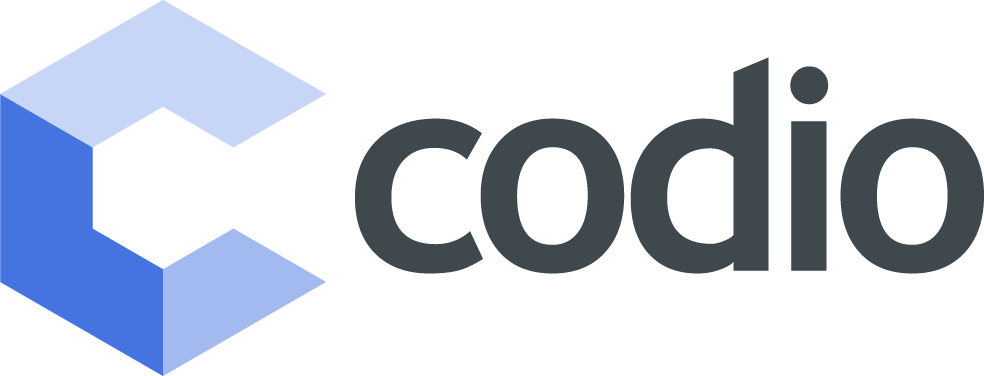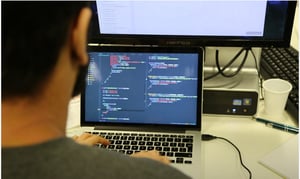Ensure academic integrity in programming courses with Codio's plagiarism checker.
There are various forms of student code copying, ranging from desirable collaboration to straightforward cheating. Codio is pleased to announce the launch of a best-in-class code plagiarism detection technology called Etector into its platform. As you will see, instructors agree that Etector is the best plagiarism checker on the market for code.
Why use plagiarism detection?
The reason to detect code copying is not to catch students and then name and shame them. Rather it is a highly useful way of understanding both desirable (collaboration) and undesirable (cheating) behavior.
Above-average levels of cheating might suddenly happen because a module is not well structured or taught. Or one particular assignment is just a lot harder than you thought, and so students 'borrow' a little code from one another to get the assignment in on time.
Understanding the integrity of students, and by extension the course and the institution, also matters, and our plagiarism detection features are there to help with different aspects of quality, not to decide who needs punishment.
Are plagiarism checkers 100% accurate?
No plagiarism checker is 100% accurate. Some will detect evidence of cheating that, on review by an instructor, reveals itself to be collaborative work or even coincidence. Others will miss instances of cheating because of a weak repository against which to compare. Etector aims to fix that, at least as far as code is concerned, permitting instructors to quickly identify plagiarized content.
Etector detects twice as many cases of code cheating over standard tools.
While writing and video plagiarism checkers have existed for some time, a solution was needed to accurately assess cheating in programming classes. Etector was originally developed for and privately released to a group of universities including Princeton University and the University of Pennsylvania.
Benedict Brown from the University of Pennsylvania says “We had been using other systems and were delighted that Etector is twice as effective at detecting cheating. We are delighted to hear that Codio has now integrated Etector and made it available within their platform.”
The plagiarism checker ensures lecturers and teachers of computer science courses make their own decisions on how to interpret results. However, the plagiarism detection report provides enough data and analysis for a lecturer to make a conclusive, final decision. The burden of project data preparation and submission to remote systems such as Moss and JPlag is removed, resulting in a single-click process for the lecturer or teacher.
Or click here if the embedded video is not displaying
There are various C++ and Python plagiarism checkers online such as Moss and JPlag. However, these systems were not developed for university programming courses. Therefore, they can require considerable effort to submit large files of student code projects, to check for plagiarism, and interpret the results.
Vivek Pai, the creator of the Etector technology, was a Computer Science professor at Princeton University where he was unhappy with the results of existing plagiarism detection systems. "I found myself spending an awful lot of time, in short supply in CS departments, trying to interpret the statistical output of existing systems.
Doing this for potentially hundreds of submissions was a real burden. I needed output that not only provided clearer rankings but also did a better job of detecting matches for any given pair or group of submissions. Both Princeton and other universities have been delighted at the improvements Etector has delivered."
Codio integration of Etector delivers even greater time savings thanks to its ability to manage the entire code preparation process.
"Etector is now seamlessly embedded into the Codio platform. This removes the need to manually prepare hundreds of student projects before submitting them to a remote plagiarism engine. Codio has effectively reduced the checking process to a single click." - says Freddy May, Chief Product Officer
Supported Languages
Codio is programming language agnostic and so supports almost all programming languages. There are special parsers for Java, C, C++, and a Python code plagiarism checker that delivers a little more accuracy.
How it works
Codio has made the process extremely simple. Select a class and an assignment or code project. The image below shows students who have completed the Bubble Sort assignment. Select the 'Plagiarism' button and a new window will open with Plagiarism results.
Product Video of Detection Checker
On the next screen you can restrict file types to check. Select the 'Start' button to generate a new report.
The Plagiarism Detection Report
The final plagiarism detection report compares the student files. You can also check against other reference projects and code files.
The final report allows the lecturer to drill into projects that show similarities. Color coding and font sizes are used to assist the lecturer in making decisions. The report highlights similar projects in ranked lists along with various statistical pointers. The technology highlights suspected areas and their differences in a student's code.
Alternatively, you can view suspect student projects side by side.
This fully integrated plagiarism detector makes Codio an even more powerful tool for instructors to use in their classrooms. If you’d like to learn more:
Get Started Today - schedule demo or create a free instructor account
Related Links




